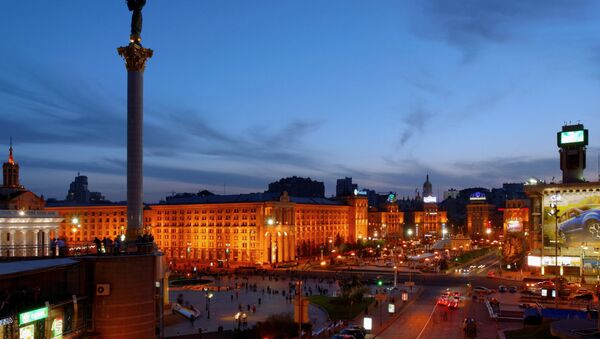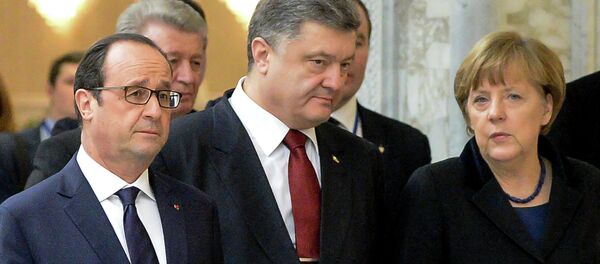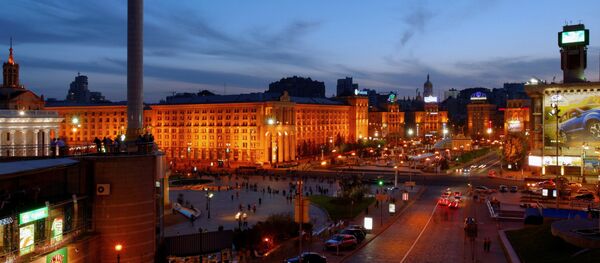Earlier this week, Ukraine's so-called 'Ministry of Temporarily Occupied Territories' prepared a comprehensive list of persons, organizations and political parties who participated in Russia's federal parliamentary elections on September 18, handing them over to the cabinet of ministers for consideration. The individuals and groups (comprising upwards of 1,500 people) would be listed for helping to organize elections on the peninsula last month.
According to the phantom ministry's press statement, they are now carrying out "preparatory work and the collection of information" on the relevant individuals and groups.
Crimea voted overwhelmingly to break off from Ukraine and rejoin Russia in a peninsula-wide referendum in March 2014, weeks after the Maidan coup d'état in Kiev. Soon after that, facing a civil war in the country's east, Kiev, Brussels and Washington introduced a series of anti-Russian sanctions against Moscow, blaming it for the crisis.
Ukrainian authorities also took additional measures, including banning Russian cultural figures and journalists from working in the country, restricting Russian media, books, movies and television shows, closing the skies to Russian airliners and blocking Russian transport truckers from passing through Ukrainian territory. Kiev also forced many Ukrainian companies to break off cooperation with Russia.
Still, as Svobodnaya Pressa columnist Svetlana Gomzikova points out, whenever Kiev receives the inevitable more or less symmetrical response, they start hysterically blaming Moscow for Kiev's increasingly difficult economic situation.
"It's enough to recall the accusatory speech of former Prime Minister Arseniy Yatsenyuk, who damned the Kremlin for introducing a food embargo against Ukraine after Kiev joined [Western] anti-Russian sanctions," the journalist noted.
Ultimately, the journalist noted that "it turns out that each time, Ukraine's leaders shoot themselves in the foot, and then start looking for someone to blame. The question is: How much longer can this continue?"
Speaking to the online newspaper, political scientist and Ukraine expert Dmitri Zhuravlev suggested that unfortunately, the answer to that question is — "for a long time still."
There are two main groups within Ukraine's elite, the analyst explained. On the one hand are those who "sincerely believe that Russia is to blame for everything." On the other are those who "think it is necessary to carry on with this propaganda, since if they do not, Ukrainians will 'raise them up on pitchforks', because what was once one of the richest countries in the Commonwealth of Independent States will soon face a situation where people have nothing to eat…"
Zhuravlev suggested that the second group may attempt to "quietly normalize relations with Russia," in the economic sense, "while continuing to berate us on political issues." But it's unlikely that Moscow will agree to go along with such a demeaning approach, according to the analyst. Nor would Kiev's curators from Washington, or its own base of radical supporters.
The key problem for the Ukrainian economy, the expert recalled, is that having cut itself off from Russia, the country has demonstrated its inability to reach European standards. This applies to everything from agricultural exports, to what's left of Ukraine's machine-building and hi-tech industries –including rocketry, aircraft, and ships. Europe, meanwhile, has been in no hurry to assist, having trouble propping up the economies of the tiny Baltic States, much less a massive country like Ukraine, with its 40 million plus people.
"It will not affect the legitimacy of the new Duma in any way. Nor will it affect the majority of Russia's political and business elites, who now have nothing to do in Ukraine today. Therefore, in and of themselves, these personnel sanctions have no role whatsoever," the analyst stressed.
Nevertheless, Apetyan added that the new measures could be a kind of message to Kiev's Western partners, with the hope that the latter take note and apply similar measures, particularly in the event that Hillary Clinton is elected president in November.





